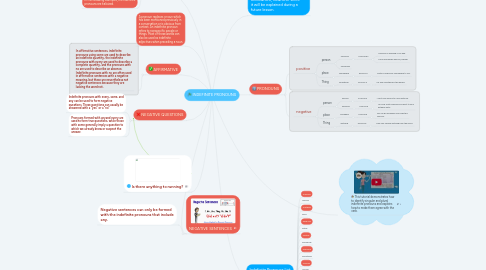INDEFINITE PRONOUNS
by Moises Bonilla


1. AFFIRMATIVE
1.1. In affirmative sentences, indefinite pronouns using some are used to describe an indefinite quantity, the indefinite pronouns with every are used to describe a complete quantity, and the pronouns with no are used to describe an absence. Indefinite pronouns with no are often used in affirmative sentences with a negative meaning, but these are nevertheless not negative sentences because they are lacking the word not.
2. NEGATIVE QUESTIONS
2.1. Indefinite pronouns with every, some, and any can be used to form negative questions. These questions can usually be answered with a "yes" or a "no"
2.2. Pronouns formed with anyand every are used to form true questions, while those with some generally imply a question to which we already know or suspect the answer.
3. Is there anything to running?
4. NEGATIVE SENTENCES
4.1. Negative sentences can only be formed with the indefinite pronouns that include any.
5. A pronoun replaces a noun which has been mentioned previously in a conversation or is obvious from context. An indefinite pronoun refers to nonspecific people or things. Most of these words can also be used as indefinite adjectives when preceding a noun.
6. Examples
6.1. Somebody ate my sandwich!
6.2. Either choice has its advantages.
6.3. Many are called, but few are chosen.
6.4. In the following examples, the indefinite pronouns are italicized.
7. PRONOUNS
7.1. positive
7.1.1. person
7.1.1.1. someone
7.1.1.1.1. EXAMPLES
7.1.1.2. somebody
7.1.2. place
7.1.2.1. somewhere
7.1.2.1.1. EXAMPLE
7.1.3. Thing
7.1.3.1. something
7.1.3.1.1. EXAMPLE
7.2. negative
7.2.1. person
7.2.1.1. anyone
7.2.1.1.1. EXAMPLE
7.2.1.2. anybody
7.2.1.2.1. EXAMPLE
7.2.2. place
7.2.2.1. anywhere
7.2.2.1.1. EXAMPLE
7.2.3. Thing
7.2.3.1. anything
7.2.3.1.1. EXAMPLE
